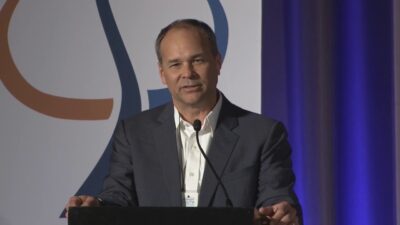
Steve Patrick, Vice President of the Aspen Institute and Executive Director of the Forum for Community Solutions, reflects on his personal connection to Harris Wofford and the death of the civil rights champion.
The country lost a great leader when Harris Wofford passed away yesterday – somewhat appropriately and ironically on MLK Day. He was 92 years old. His condensed life history is worth reading.
From my own point of view, Harris Wofford was a champion for civil rights and one of the most important bridge builders in the history of this country’s ongoing struggle(s) to achieve a more perfect and equitable union. As an advisor to Martin Luther King, and the first white person to graduate from Howard Law School, he used to joke that his job was to “help King get into jail,” in order to demonstrate the injustices in our justice system.
While Senator Wofford had a remarkable career as special advisor to president Kennedy on Civil Rights; helping Sergeant Shriver to launch the Peace Corps; as President of Bryn Mawr College; and as a US Senator from Pennsylvania, he was perhaps best known for having saved AmeriCorps while serving as the CEO of the Corporation for National and Community Service during the Clinton Administration. During his tenure at CNCS, Harris was able to win over many of the opponents to national service by organizing members of congress and exposing them to the good AmeriCorps work taking place in their home states and districts. He also famously found common ground by attending prayer breakfasts with members of the Republican party during a time of deep partisanship.
During his lifetime, Harris was a mentor to countless individuals and touched the lives of so many, myself included. Over twenty years ago, when I was a part of a group of individuals who were working to establish Rocky Mountain Youth Corps in Northern New Mexico, Harris went out of his way to show his support. He traveled all the way to NM to visit our fledgling operation and then helped us to make connections to further the work in the years and decades that followed. Always making time for a visit. Always enthused by even the smallest of victories. Always a champion for so many in the service movement.
Harris Wofford’s influence extended to my own children. Seven or eight years ago, I shared with Harris that my family was coming to Washington, DC. He immediately insisted on giving my sons a tour of the Senate and shared remarkable stories with them. As we were sharing lunch after the tour, I asked Harris if he had a favorite decade, he said he had loved every year of his life and could not pick a time that meant more than any other. I asked him to share a moment of pride from the Civil Rights movement and as an always humble man, he reluctantly shared that early in his life, after he had studied Gandhi and embraced non-violent civil disobedience, he was taking a Gandhian activist on a trip through the US in 1950. They visited the famous Highlander Center in Tennessee founded by Myles Horton – where so many leaders in the civil rights movement would go on to receive training. During the visit, Harris and his colleague from India were surprised to learn that the center had no curriculum focused on nonviolent resistance. They vowed to help develop the training curriculum for Highlander. The following year, Rosa Parks participated in that training. The rest is history. As with so many important moments in the justice and service movements, Harris Wofford was behind the scenes, making the connections and never needing to take credit. He will be missed!
We can only hope that his kind of selfless leadership will experience a renaissance and multiply in the years ahead. With such a legacy and so many foot soldiers who learned from him, that change will come! Thank you, Harris Wofford, for changing and improving the lives of so many in this world.